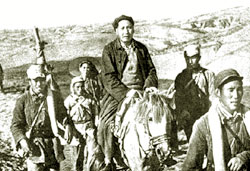 Every nation has its founding myth. For Communist China, it is the Long March - a story on a par with Moses leading the Israelites' exodus out of Egypt. I was raised on it.
Every nation has its founding myth. For Communist China, it is the Long March - a story on a par with Moses leading the Israelites' exodus out of Egypt. I was raised on it.
The myth can be stated succinctly. The fledgling Communist Party and its three Red Armies were driven out of their bases in the South in the early 1930's by Chiang Kaishek's Nationalist government. Pursued and harried by their enemies, they crossed high mountains, turbulent rivers and impassable grassland with Mao steering the course from victory to victory. After two years and 10,000 miles of endurance, courage and hope against impossible odds, the Red Armies reached northwest China. Only a fifth of the 200,000 soldiers remained, worn out, battered but defiant. A decade later, they fought back, defeated Chiang Kaishek and launched Mao's New China.
How does China's founding myth stand up to reality?
In 2004, seventy years after it began, I set out to retrace the Long March. It remains a daunting journey, through areas little changed to this day-inaccessible and desperately poor. Of the 40,000 survivors, perhaps 500 are still alive. I tracked down and interviewed 40 of them-ordinary people who were left behind or managed to reach the end but with stories that are highly instructive.
Huang Zhiji was a boy, little taller than his rifle, when he joined the Red Army. He had no choice: they had arrested his father and would not release him until Huang agreed. He thought of deserting but stayed for fear of being caught and shot. Many did run away.
Six weeks into the March, Mao's First Army was reduced from 86,000 to 30,000 troops. The loss is still blamed on the Xiang River Battle, the Army's first big engagement of the March. But at most 15,000 died in battle. The rest vanished.
Another battle, over the Dadu River, is the core of the Long March legend: 22 brave men supposedly overpowered a regiment of Nationalist troops guarding the chains of the Luding Bridge with machine guns and opened the way for the Marchers. Mao told Edgar Snow, author of Red Star Over China, that crossing the Dadu River was the single most important incident during the Long March and today it is eulogised as such.
But documents that I have seen indicate that the general who commanded the division that crossed the Dadu River first told Party historians a very different story. "This affair was not as complicated as people made it out to be later," he said. "When you investigate historical facts, you should respect the truth. How you present it is a different matter."
So the legend lives on. There was only a skirmish over the Dadu River. The local warlord, who hated Chiang Kaishek, let Mao pass. As a reward, he was later made a minister in the Communist government.
The Marchers didn't know where they would end up. There were constant debates about the final destination. When they converged in north China in October 1936, it was hailed as the end of the March. But the 'promised land' was not as promised. It could barely support its own population, let alone the Red Armies.
Soldiers had no clothes to protect them from freezing cold. Women were ordered to turn back and go home because there was not enough food. Barely a month after the union of the three Red Armies, the Party decided that the Long March was to continue. But the kidnapping of Chiang Kaishek by the general he had appointed to wipe out the Communists saved them. As part of the price for his release, Chiang recognised the Communists as legitimate. The Long March was over.
Not, however, for the 21,000 men and women of the Western Legion. They belonged to the Fourth Army, headed by Zhang Guotao, Mao's archrival. Their mission was to get help from Russia at the border in western China. But Mao kept sending them contradictory orders, the result was that they could neither fight nor retreat.
Trapped in barren land where survival was difficult, the overwhelming forces of Muslim warlords wiped them out. Only 400 reached the border, the rest were killed or captured.
It was the Red Army's biggest defeat. Yet it is missing from official history. Wang Quanyan, a senior officer, was taken by a Muslim commander as a concubine. That was enough to make her a traitor in the eyes of the Party, negating all her years of dedication. She and the rest of the Fourth Army survivors had to fight for half a century to be recognised as Marchers.
The Long Marchers persevered, fought, starved, despaired and endured. Hunger drove the armies to take hostages for ransom. Purges continued until practically no officers were left to command battles. If the Marchers had doubts, they conquered them with the help of Communist propaganda. They rose to their ordeal with a bravery and self-sacrifice unsurpassed in China's or anyone's history.
What motivated them? I asked a top general what he knew of communism at the time. "I had no idea then and now," he replied. "I doubt that even Mao knew what it was."
Sun Shuyun is author of The Long March, to be published in March 2006.


